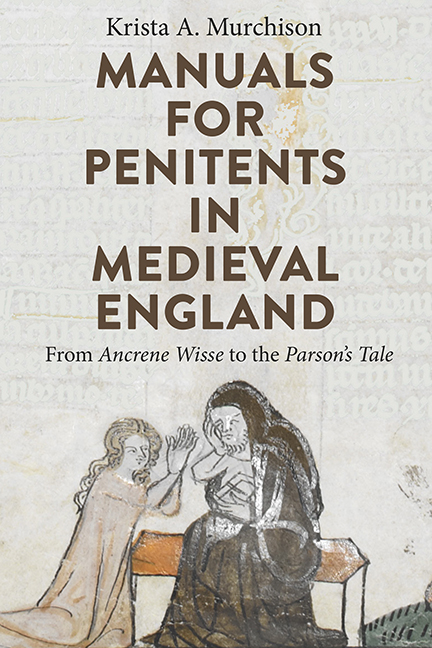Book contents
- Frontmatter
- Contents
- Acknowledgements
- Abbreviations
- Note on the Translation and Treatment of Texts
- A Chronological List of Key Manuals for Penitents and Associated Works
- Introduction: Teaching Sin
- Part I Self-Examination Writing before 1250
- Part II Manuals for Penitents, 1250–1300
- Part III Manuals for Penitents, 1300–1350
- ‘To enden in som vertuous sentence’: Concluding with Chaucer’s Parson
- Bibliography
- Index
6 - Teaching Virtue
Published online by Cambridge University Press: 07 October 2022
- Frontmatter
- Contents
- Acknowledgements
- Abbreviations
- Note on the Translation and Treatment of Texts
- A Chronological List of Key Manuals for Penitents and Associated Works
- Introduction: Teaching Sin
- Part I Self-Examination Writing before 1250
- Part II Manuals for Penitents, 1250–1300
- Part III Manuals for Penitents, 1300–1350
- ‘To enden in som vertuous sentence’: Concluding with Chaucer’s Parson
- Bibliography
- Index
Summary
In 1281, under the watch of the Franciscan Archbishop of Canterbury John Pecham, educational programs that had been developing through local constitutions became part of a wide-scale project. Pecham's Constitutions, instituted at the Council of Lambeth, are often considered the most influential documents for the development of medieval education and for vernacular literature. They required that priests teach all members of their parishes a set program four times a year: the articles of the faith – which had expanded in the same century from twelve to fourteen – the Ten Commandments, the two precepts of the gospels (to love God with one's full heart and soul and to love one's neighbour as one loves oneself), the seven works of mercy, the seven deadly sins with their progeny, the seven principal virtues, and the seven sacraments. These concepts were to be expounded in the vernacular, ‘without any fanciful and subtle compositional art’.
It is generally held that this emphasis on lay education stoked a desire for vernacular works, of which manuals for penitents, like Handlyng Synne, formed an important part. Of course, Pecham's decree was clearly not a novelty; it would have struck a familiar chord with many in attendance at the Council of Lambeth, given that similar decrees had been passed by Richard Poore in 1219 and, at a more local, diocesan level, by Grosseteste in 1238. And Pecham's decree did not give rise to vernacular pastoral writing by any stretch – the vernacular manuals for penitents produced before this decree, such as the Manuel des péchés, speak to a strong tradition of vernacular pastoral writing in England preceding it. Nevertheless, the emphasis on pastoral learning promoted by the 1281 Lambeth Constitutions must have helped bolster the popularity of this new wave of texts.
The holistic educational program that was authenticated and promoted by Pecham led to an increasingly large repertoire of tools for self-analysis. By the fourteenth century, penitents were being encouraged to examine their consciences through not just the five senses, the deadly sins, and the Ten Commandments, but also the works of mercy, the sacraments, and the seven virtues. As we have already seen, and as this chapter further establishes, when these essentials appear in manuals for penitents, they are not impersonal tracts designed for rote repetition but sites of deeply engaged, transformative reading.
- Type
- Chapter
- Information
- Manuals for Penitents in Medieval EnglandFrom <i>Ancrene Wisse</i> to the <i>Parson’s Tale</i>, pp. 116 - 143Publisher: Boydell & BrewerPrint publication year: 2021



